Viewing a response to: @mikewick77/qe6oot
 Smallest Organisms https://en.m.wikipedia.org/wiki/Smallest_organisms Dinitroanilines Microtubule-targeting agents (MTAs), also known as microtubulebinding agents, microtubule-interfering drugs, anti-microtubule drugs, or simply microtubule poisons Microtubule-Targeting Agents: Strategies To Hijack the Cytoskeleton Microtubular cytoskeletons of parasitic protozoa Microtubule-targeting agents and their impact on cancer treatment https://www.sciencedirect.com/science/article/pii/S0171933520300145 https://en.m.wikipedia.org/wiki/Hydrogel_encapsulation_of_quantum_dots .. going threw this old book.. Nutrition and Feeding Strategies in Protozoa Brenda Nisbet found this.. these are aquatic, but it says they are the smallest Microsporidia & make spores. spores make me think much smaller then parent host, small like like exosome mycoplasma or virus, potentially avain or airborn. https://en.m.wikipedia.org/wiki/Microsporidia Microsporidia are a group of spore-forming unicellular parasites. They were once considered protozoans or protists, but are now known to be fungi, or a sister group to fungi. Microsporidia have the smallest known (nuclear) eukaryotic genomes. The parasitic lifestyle of microsporidia has led to a loss of many mitochondrial and Golgi genes, and even their ribosomal RNAs are reduced in size compared with those of most eukaryotes. Currently known microsporidial genomes are 2.5 to 11.6 Mb in size, encoding from 1,848 to 3,266 proteins which is in the same range as many bacteria. (same size as bacteria, might be misidentified as bacteria?) .. https://en.m.wikisource.org/wiki/1911_Encyclopædia_Britannica/Endospora https://scialert.net/fulltextmobile/?doi=ajava.2012.842.850&org=10  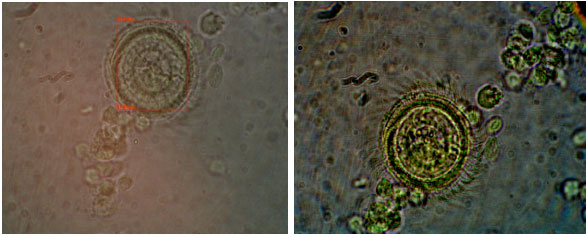 Phenanthridine https://en.m.wikipedia.org/wiki/Phenanthridine https://en.m.wikipedia.org/wiki/Nitroimidazole https://en.m.wikipedia.org/wiki/Endopeptidase https://en.m.wikipedia.org/wiki/Pepsin https://en.m.wikipedia.org/wiki/Pepstatin https://en.m.wikipedia.org/wiki/Chlorambucil Hemoglobin proteolytic systems falcipains cysteine proteases ubiquitin proteasomal system (UPS) .. Blocking Plasmodium falciparum development via dual inhibition of hemoglobin degradation and the ubiquitin proteasome system by MG132 https://pubmed.ncbi.nlm.nih.gov/24023882/ Plasmodium falciparum cysteine protease falcipain-2 captures its substrate, hemoglobin https://www.ncbi.nlm.nih.gov/pmc/articles/PMC1166610/ .. 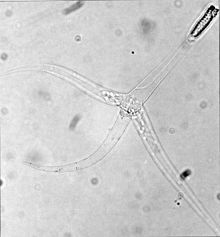 Myxozoa Spore 10 μm https://en.m.wikipedia.org/wiki/Myxozoa https://en.m.wikipedia.org/wiki/Micrometre https://en.m.wikipedia.org/wiki/Nanometre https://en.m.wikipedia.org/wiki/Obligate_parasite https://en.m.wikipedia.org/wiki/Intracellular_parasite https://en.m.wikipedia.org/wiki/Apicomplexa https://en.m.wikipedia.org/wiki/Polistes_atrimandibularis Evasion of host defences A number of obligate intracellular parasites have evolved mechanisms for evading their hosts' cellular defences, including the ability to survive in distinct cellular compartments. One of the mechanisms that hosts employ in their attempt to reduce the replication and spread of pathogens is apoptosis (programmed cell death). Some obligate parasites have developed ways to suppress this phenomenon, for example Toxoplasma gondii although the mechanism is not yet fully understood. .. im looking for something smaller the this. Myxozoa Spore 10 μm similar to Microsporidia with Apicomplexa Toxoplasmosis .. Nanometers (nm) Marine Viruses 40 nm - 400 nm Bacteria 1000 nm Algae 5000 nm Poliovirus 30 nm 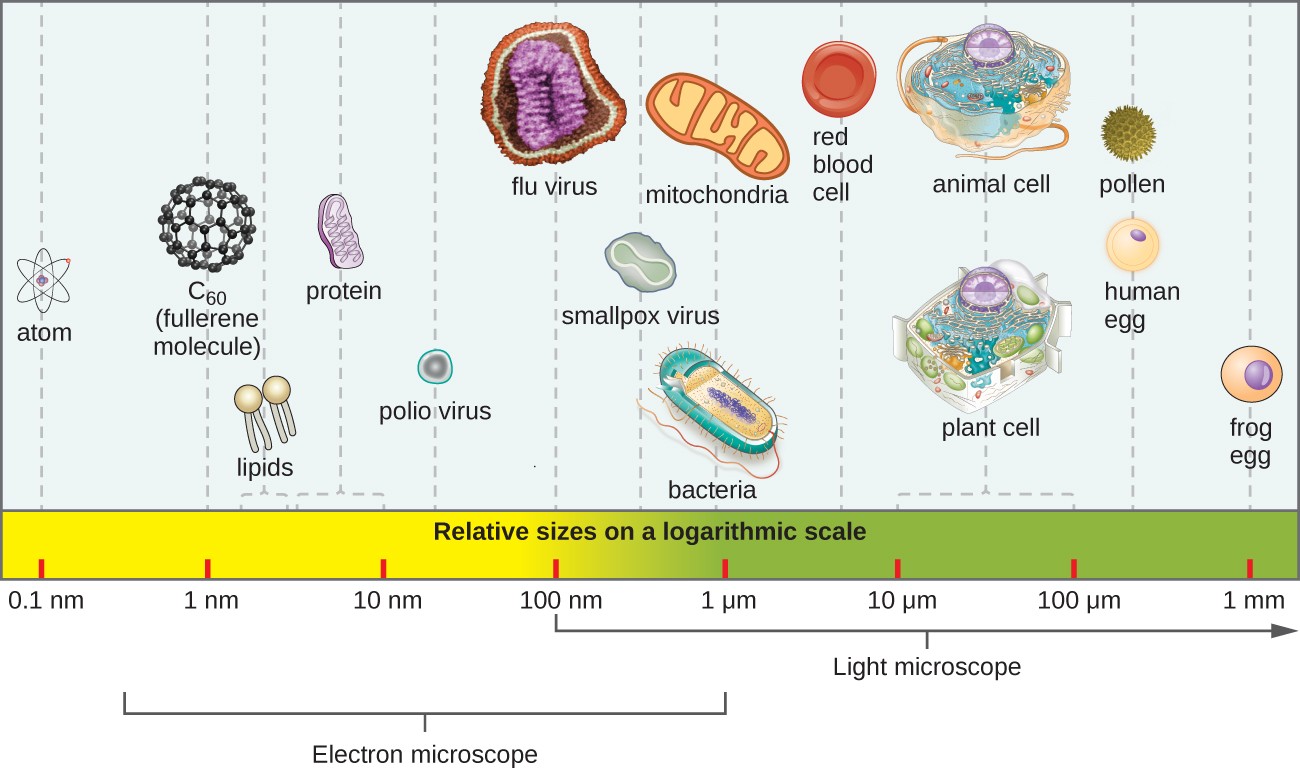  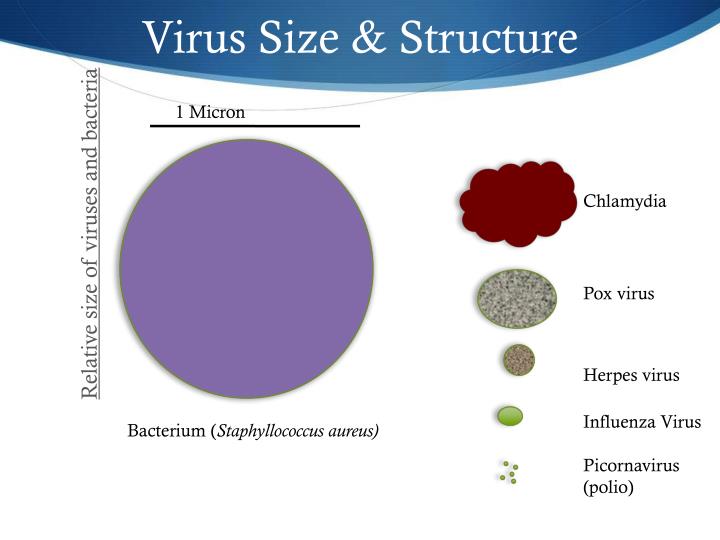 https://en.m.wikipedia.org/wiki/Poliovirus .. Genitalium is flask-shaped (about 300 - 600 nm) Pneumoniae is more elongated (about 100 - 1000 nm). Hundreds of mycoplasma species infect animals. Virus range in size from about 20 to 400 nanometres in diameter. Mycoplasma is bigger than Virus. https://cronodon.com/BioTech/bacteria_mycoplasmas.html https://www.microscopemaster.com/mycoplasmas.html .. https://en.m.wikipedia.org/wiki/Mycoplasma https://en.m.wikipedia.org/wiki/Mollicutes .. https://www.microscopemaster.com/mycoplasmas.html 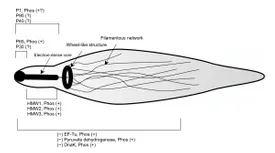 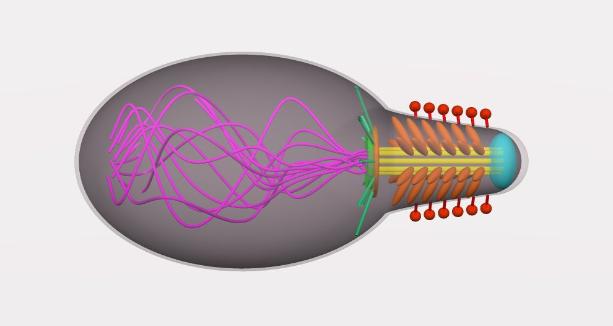 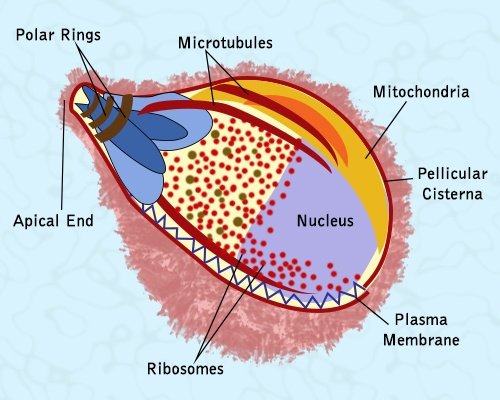 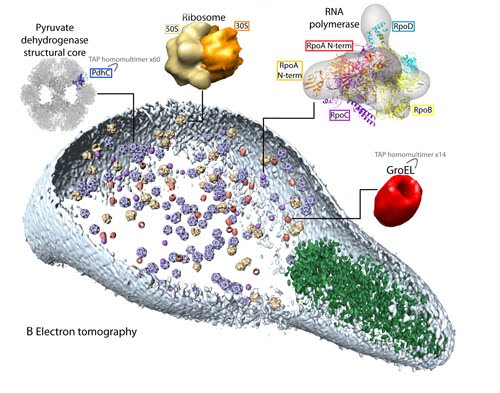 .. https://en.m.wikipedia.org/wiki/Mononegavirales https://en.m.wikipedia.org/wiki/Hendra_virus https://en.m.wikipedia.org/wiki/Henipavirus https://en.m.wikipedia.org/wiki/Hydrozoa https://en.m.wikipedia.org/wiki/Placozoa https://en.m.wikipedia.org/wiki/Cnidaria https://en.m.wikipedia.org/wiki/Polypodium_(animal) https://en.m.wikipedia.org/wiki/Choanozoa The field of embryogenesis uses the word syncytium to refer to the coenocytic blastoderm embryos of invertebrates. https://en.m.wikipedia.org/wiki/Syncytium https://en.m.wikipedia.org/wiki/Blastoderm
| author | mikewick77 |
|---|---|
| permlink | qe9q8b |
| category | mikewick77 |
| json_metadata | {"app":"hiveblog/0.1","links":["https://en.m.wikipedia.org/wiki/Smallest_organisms","https://www.sciencedirect.com/science/article/pii/S0171933520300145","https://en.m.wikipedia.org/wiki/Hydrogel_encapsulation_of_quantum_dots","https://en.m.wikipedia.org/wiki/Microsporidia","https://en.m.wikisource.org/wiki/1911_Encyclopædia_Britannica/Endospora","https://scialert.net/fulltextmobile/?doi=ajava.2012.842.850&org=10","https://en.m.wikipedia.org/wiki/Phenanthridine","https://en.m.wikipedia.org/wiki/Nitroimidazole","https://en.m.wikipedia.org/wiki/Endopeptidase","https://en.m.wikipedia.org/wiki/Pepsin","https://en.m.wikipedia.org/wiki/Pepstatin","https://en.m.wikipedia.org/wiki/Chlorambucil","https://pubmed.ncbi.nlm.nih.gov/24023882/","https://www.ncbi.nlm.nih.gov/pmc/articles/PMC1166610/","https://en.m.wikipedia.org/wiki/Myxozoa","https://en.m.wikipedia.org/wiki/Micrometre","https://en.m.wikipedia.org/wiki/Nanometre","https://en.m.wikipedia.org/wiki/Obligate_parasite","https://en.m.wikipedia.org/wiki/Intracellular_parasite","https://en.m.wikipedia.org/wiki/Apicomplexa","https://en.m.wikipedia.org/wiki/Polistes_atrimandibularis","https://en.m.wikipedia.org/wiki/Poliovirus","https://cronodon.com/BioTech/bacteria_mycoplasmas.html","https://www.microscopemaster.com/mycoplasmas.html","https://en.m.wikipedia.org/wiki/Mycoplasma","https://en.m.wikipedia.org/wiki/Mollicutes","https://en.m.wikipedia.org/wiki/Mononegavirales","https://en.m.wikipedia.org/wiki/Hendra_virus","https://en.m.wikipedia.org/wiki/Henipavirus","https://en.m.wikipedia.org/wiki/Hydrozoa","https://en.m.wikipedia.org/wiki/Placozoa","https://en.m.wikipedia.org/wiki/Cnidaria","https://en.m.wikipedia.org/wiki/Polypodium_","https://en.m.wikipedia.org/wiki/Choanozoa","https://en.m.wikipedia.org/wiki/Syncytium","https://en.m.wikipedia.org/wiki/Blastoderm"],"image":["https://images.hive.blog/DQmejmgoBbg4ACLSrNJXShvbk1TjP8iTvTDMg6kY19Nxe4q/20200805_190156.jpg","https://images.hive.blog/DQmSugktX5qTp8KL15qnqJmVUvR4JjuEYQ3aPCYBpuXhzwn/fig2-2k12-842-850.jpg","https://images.hive.blog/DQmW85ZmoQfDMJuG9iD8EJjS7ggpQ4spo3CJKUpftmW68MN/fig8-2k12-842-850.jpg","https://images.hive.blog/DQmdYbje3fNBJ8TdRYgoFM5DrrDDHMbh9jrs8N4UKH17MpW/220px-Fdl17-9-grey.jpg","https://images.hive.blog/DQmYXDGRdqN7tx2cFTuVLSWV2T24EfMxjh2BFfjgEXicRR5/OSC_Microbio_01_03_sizes.jpg","https://images.hive.blog/DQmViMAkwAZfLoAhaBdZibNakoz3nhK26hycswxLYbCwtrY/a355568f5b83289cb05bccd8e8db1c54--biology-infographic.jpg","https://images.hive.blog/DQmSp5vHRcQFMcdbNx9zKYF9rg1vL5VcWkpv93wjZLUp4eV/virus-size-structure-n.jpg","https://images.hive.blog/DQmbH59EEXBphyWj9dncGV36Dem6j6LGQVcGyn7b3XcVME9/mycoplasma.webp","https://images.hive.blog/DQmf1mRYpMFfnR1GccMxqDuhK4PC81ziuWB1S2SV1yGebyy/mycoplasma_pneumoniae-613x326.jpg","https://images.hive.blog/DQmYxgbvzHRCBUNAYN7upkXhMFCqJz42fMdmwCdQhNeky5q/54TLbcUcnRm4Bw8fmw3Y3ebiYW61dkW16qTycFmMN9YqPfiSGJiaPNKDqsuNJPjQFrTJXx8CJE25amkGG6mnA7YbtEARbH8usJiPtJkEX2DPLK8cSpYYyxFKhWyFN9y4ZjUGFDxfp.jpeg.jpg","https://images.hive.blog/DQmV8VZRKYkN9hmWXqr3GiRQCmv9p1x11B4U7joud5TWvdf/simple_complex-cell.jpg"]} |
| created | 2020-07-30 06:05:00 |
| last_update | 2020-08-13 01:52:09 |
| depth | 2 |
| children | 0 |
| last_payout | 2020-08-06 06:05:00 |
| cashout_time | 1969-12-31 23:59:59 |
| total_payout_value | 0.000 HBD |
| curator_payout_value | 0.000 HBD |
| pending_payout_value | 0.000 HBD |
| promoted | 0.000 HBD |
| body_length | 6,390 |
| author_reputation | 545,063,717,246 |
| root_title | "Beam Me Up" |
| beneficiaries | [] |
| max_accepted_payout | 1,000,000.000 HBD |
| percent_hbd | 10,000 |
| post_id | 98,794,257 |
| net_rshares | 0 |
 hiveblocks
hiveblocks